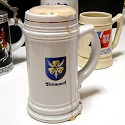
Seekriegsleitung Minutes of the Visit of the Commander in Chief, Navy, at the Führer Headquarters Wolfsschanze on 20 and 21 March 1944. A. The Commander in Chief, Navy, had several private talks with the Führer. In addition, the Commander in Chief, Navy, reported to the Führer on the following points: 1. Only the Navy can determine the use of combat units and weapons of all types at sea. This naturally applies to high speed landing craft. It is planned to use the small battle weapon "Mohr" [manned torpedo] at Nettuno. The Führer agreed. 2. The effects of the loss of Odessa on shipping and the general situation in the Black Sea, especially on supplies for the Crimea. The Führer again emphasized that he wants to hold the Crimea. For that reason he already mentioned the consequences of its loss to the Army High Command [OKH], telling them that Odessa must be held. The Führer asked the Commander in Chief, Navy, to write a memorandum explaining the importance of Odessa for holding the Crimea, so that the commanding generals of the Army would hear these things not only from the Führer, but also from someone else. 3. The disastrous financial situation of Greece and its effects on ship repairs. The Führer believes that the workers should be paid in terms of room and board in order to avoid the problems of inflation. 4. The problem of the alarm units in the West. The Commander in Chief, Navy, explains in detail what the 27,000 men being trained there mean for naval warfare. He wants them to fight only for the protection of their own stations. Field Marshals von Rundstedt and Rommel state that the Navy would get these men back. But the Commander in Chief, Navy, replies that this is very uncertain, since no one has control over developments in case of an invasion. The Führer believes that, in case they should be needed, a special decision will have to be made about the disposition of the training units. He instructs the OKW to give corresponding orders to the various branches of the Wehrmacht. 5. Attention must be given to the weakness of the anti-invasion and coastal defenses in the German Bight, even if an enemy landing there seems unlikely at the moment. The Führer promises that something will be done to strengthen this vulnerable spot after projects in the West are completed, i.e. in the spring, by the end of April. 6. Plans for the use of naval forces on the Peipus Lake. The Führer points out that Russia would be certain to transport naval forces from Leningrad to the Peipus Lake. 7. Matters pertaining to the arrest of the French admirals. The Führer decides that the following French admirals should not be put under arrest:
b. Those whom we consider trustworthy. 8. Plans to use submarines more sparingly in view of the high losses, except in the event of an invasion. The Führer gives his consent. 9. Regrettably high shipping losses in the northern area. The situation can be expected to improve only when more escort forces are available. Much too little has been built during the last few years. The Führer asked when the increase in S-boat construction would take effect. 10. Plans for placing additional available anti-submarine guns South of the Gironde for coastal defense. The Führer welcomes this. He demands, however, that the Navy extend the mine barrages in shallow waters and on the beaches in the West. B. The extent of authority held by fortress commanders in the West (jurisdiction, disciplinary authority, etc.), was discussed with the OKW. The OKW will issue an order concerning this. C. The Commander in Chief, Navy, discussed with Gauleiter Kaufmann the plans for changes in naval transport operations in the Norwegian area. The Reich Commissioner of Maritime Shipping was in agreement. The OKW will issue the necessary directives.
countersigned: Oberleutnant zur See Mommert
|
 BOOK: The Battleship Bismarck. The Complete History of the Ship.
 Naval & military gifts
|
